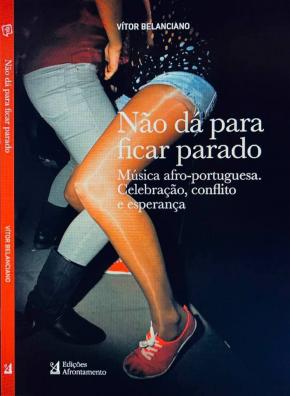The history and protagonists of Afro-Portuguese music
 Book cover | 2020 | courtesy of the author You can’t stand still. Afro-Portuguese music. Celebration, conflict and hope, by Vítor Belanciano, is the fifth and most recent title of the collection ‘Memoirs - Sons of the Empire’, which has been published in Edições Afrontamento. Telling the story of a diverse group of artists, from General D, Chullage and Djamal, to Buraka Som Sistema, Sara Tavares, Allen Halloween, Mindy Guevara, Throes + The Shine, Batida or Scúru Fitchádu, Dino d’ Santiago and the DJs of Príncipe Discos, the journalist and critic of the newspaper Público draws another cartography of contemporary Portuguese music, in which the prefix “afro” acquires centrality.
Book cover | 2020 | courtesy of the author You can’t stand still. Afro-Portuguese music. Celebration, conflict and hope, by Vítor Belanciano, is the fifth and most recent title of the collection ‘Memoirs - Sons of the Empire’, which has been published in Edições Afrontamento. Telling the story of a diverse group of artists, from General D, Chullage and Djamal, to Buraka Som Sistema, Sara Tavares, Allen Halloween, Mindy Guevara, Throes + The Shine, Batida or Scúru Fitchádu, Dino d’ Santiago and the DJs of Príncipe Discos, the journalist and critic of the newspaper Público draws another cartography of contemporary Portuguese music, in which the prefix “afro” acquires centrality.
But what does ‘Afro-Portuguese music’ mean after all - as Belanciano calls it? It’s the musical expressions produced mostly by black Portuguese people and African immigrants in Portugal that largely intertwine sounds like funaná, semba, zouk, gumbé or batuku - to name just a few examples - with the generally more globalized musical languages of rap and electronics, among others. The Afro-Portuguese music thus understood is the fruit of transits, reelaborations and transcultural, trans-generational and transnational partnerships capable of reconfiguring another history of Portuguese culture and society, in which contributions, voices and black legacies, more than recognized as part of a separate reality, are valued as vital elements in the Portuguese artistic universe.
The relevance of black participation in Portugal in the most diverse areas - including music - dates back several hundred years, but is rarely articulated in dominant public narratives. It is not, of course, that blacks in Portugal have no voice or are not present in the daily life of the country. It’s often about talking without being considered, seeing without being seen, singing without being listened to - at least outside a cultural sphere that tends to be more circumscribed.
In the last decade, however, there have been renewed spaces for debate and criticism of the place of racialized bodies and silenced voices in Portugal. This political, social and artistic movement, the fruit of a vast journey that the Memoirs project has closely followed, finds expression in literature, the visual, plastic and performing arts, the cinema, academia, activism and the media, and is inseparable from broader discussions about art, (anti)racism, visibility policies, citizenship and power hierarchies. These are the questions that the children of Buraka Som Sistema and the grandchildren of General D - symbolically speaking and referring to music in particular - enunciate. Often using their condition as artists and song as instruments of denunciation, political mobilization and intervention, production of counter-memories or cultural affirmation, these musicians claim public recognition of their place in Portuguese society and culture, as evidenced by the dozens of interviews given to Vítor Belanciano over more than a decade.
Expression of ambiguous inheritances, between celebration and silencing or conflict, much of the music, sounds and speeches of the artists called by Vítor Belanciano in this book relates (more or less, depending on the case), actively and explicitly, to issues of race and class, racism and inequalities, and to oppression and violence - police and not only that - against blacks in Portugal (see also, among others, Varela, 2020 and Andrade, 2019). They may also, in some cases, assert themselves as a response to the negative representations that so often still prevail over these men and women, in a certain Portugal still averse to confronting its colonial-racist past and its ballasts in the present.
Today, it is undeniable that the national sound landscape and that of Lisbon, in particular, is also drawn from its suburbs, namely in the Quinta do Mocho, Jamaica, Cova da Moura, Reboleira or Seixal, places that are no longer just stigmatized spaces, but as spaces for the creation and revitalization of Portuguese music. Spaces that do not have a penchant for occupying and, above all, for moving the “center”, in the very glossy expression of Ngũgĩ wa Thiong’o (1993). The book Can’t Stand Still, by Vítor Belanciano, suggests that, right from its title, which points to the political, social and cultural gesture of displacement that Afro-Portuguese music can represent for an exercise of decolonization of arts, culture and history in Portugal.
Bibliographical references:
Andrade, Soraia Simões de (2019), Fixing the (in)visible.
The first steps of RAP in Portugal (1986-1998). Casal de Cambra: Caleidoscópio.
Belanciano, Vítor (2020), Cannot stand still. Afro-Portuguese music, celebration, conflict and hope. Porto: Edições Afrontamento.
Varela, Pedro (2020), “Antirracismo e o Rap no Feminino”, Mural Sonoro, May 15.
Thiong’o, Ngũgĩ wa (1993), Moving the Centre: The Struggle for Cultural Freedoms. London: James Currey.
MEMOIRS is funded by the European Research Council (ERC) under the European Union’s Horizon 2020 Research & Innovation Framework Programme (No. 648624);
MAPS Post European Memories: a post-colonial mapping is funded by the Foundation for Science and Technology (FCT - PTDC/LLT-OUT/7036/2020).
The projects are based at the Centre for Social Studies (CES) of the University of Coimbra.